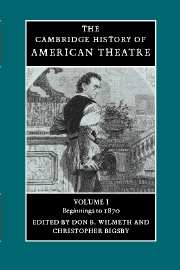Book contents
- Frontmatter
- Introduction
- Timeline: beginnings to 1870
- 1 American theatre in context, from the beginnings to 1870
- 2 Structure and management in the American theatre from the beginning to 1870
- 3 Plays and playwrights
- 4 The Actors
- European actors and the star system in the American theatre, 1752–1870
- The emergence of the American actor
- 5 Scenography, stagecraft, and architecture in the American theatre: beginnings to 1870
- 6 Paratheatricals and popular stage entertainment
- Bibliography
The emergence of the American actor
from 4 - The Actors
Published online by Cambridge University Press: 28 March 2008
- Frontmatter
- Introduction
- Timeline: beginnings to 1870
- 1 American theatre in context, from the beginnings to 1870
- 2 Structure and management in the American theatre from the beginning to 1870
- 3 Plays and playwrights
- 4 The Actors
- European actors and the star system in the American theatre, 1752–1870
- The emergence of the American actor
- 5 Scenography, stagecraft, and architecture in the American theatre: beginnings to 1870
- 6 Paratheatricals and popular stage entertainment
- Bibliography
Summary
Rounding the bend three-quarters of a mile up river from a one-horse town in Arkansas, the raft on which Huckleberry Finn floats is “a most uncommon lively place.” At that point in Huck’s narrative, the makeshift showboat carries on its crowded deck a boy (Huck), a runaway slave (Jim), a “king,” a “duke,” and all their worldly possessions. These include the theatrical prerequisites, human and material, sufficient to rehearse a multitude of roles, which the travelers are prepared to perform for one another as well as for a larger public. The fact that Huck knows the truth about the purported royals – “that these liars warn’t no kings nor dukes, at all” – detracts not at all from their urgent preparations for the forthcoming stage show:
Shakespearean Revival!!! Wonderful Attraction! For One Night Only! The world renowned tragedians, David Garrick the younger, of Drury Lane Theatre, London and Edmund Kean the elder, of the Royal Haymarket Theatre, Whitechapel, Pudding Lane, Piccadilly, London, and the Royal Continental Theatres, in their sublime Shakespearean Spectacle.
Following the balcony scene from Romeo and Juliet, featuring Mr. Garrick as Romeo and Mr. Kean as Juliet, “assisted by the whole strength of the company,” and the “thrilling, masterly, and blood-curdling broad-sword conflict” from Richard III, the playbill promises that the evening will conclude with Mr. Kean’s rendering of “Hamlet’s Immortal Soliloquy.” Adult admission was set at a quarter, a dime for children and slaves (Twain, 141-42).
- Type
- Chapter
- Information
- The Cambridge History of American Theatre , pp. 338 - 372Publisher: Cambridge University PressPrint publication year: 1998
- 1
- Cited by

